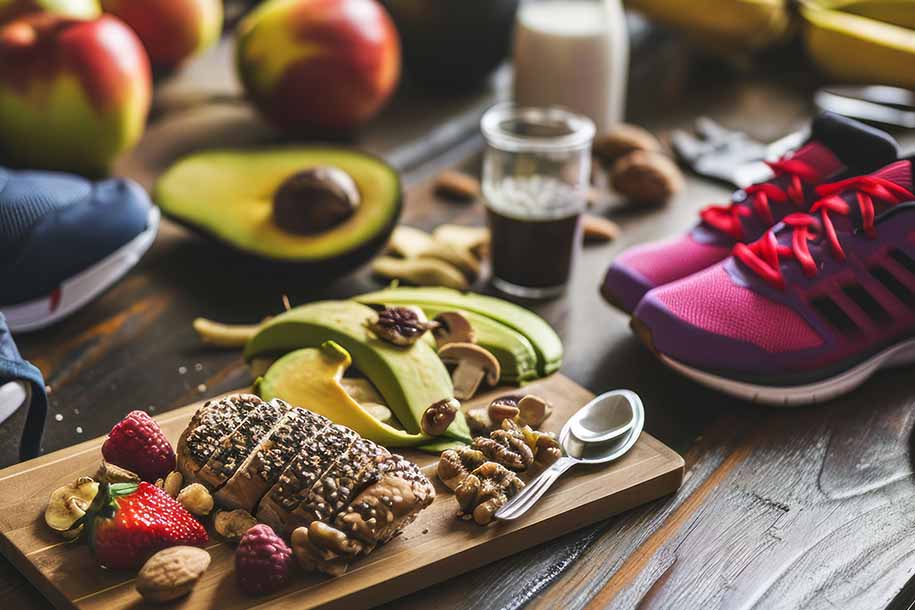Whether you’re training for a marathon, building muscle in the gym, or just trying to stay fit, nutrition plays a crucial role in achieving your goals. Eating the right foods before, during, and after your workout can improve your performance, boost your energy levels, and support your body’s recovery. Here’s a comprehensive guide to what you should be eating to optimize your workouts.
Before training: start energetically
Pre-workout nutrition is designed to provide your body with energy so that you can perform optimally. A good pre-workout meal consists mainly of carbohydrates and contains a moderate amount of protein. Carbohydrates are quickly converted into glucose, the main source of energy for your muscles during intense exercise. By adding protein, you also provide your muscles with the necessary building blocks, which is especially useful for strength training.
Some pre-workout meal ideas include:
- Oatmeal with fruit and nuts: The oatmeal provides slow carbohydrates and fiber, while the fruit provides a faster energy boost.
- Whole wheat sandwich with chicken fillet or avocado: This is a light yet energy-rich meal, easy to digest and ideal for a moderate workout.
- Banana with peanut butter: Bananas are rich in fast carbohydrates and potassium, a mineral that helps maintain your fluid balance and muscle function.
Timing: Try to eat your meal 1 to 3 hours before your workout. This gives your body time to digest the food, so you don’t suffer from stomach problems during your workout. Need something shortly before? A small snack like a banana or a rice cake can give you an easily digestible energy boost.
During training: maintain energy and hydration
Voor de meeste trainingen is extra voeding tijdens de sessie niet per se nodig, maar hydratatie is absoluut essentieel. Water drinken helpt om je lichaamstemperatuur te reguleren en voorkomt uitdroging, wat je uithoudingsvermogen en concentratie ondersteunt. Tijdens intensieve of lange trainingen (langer dan een uur) kun je naast water ook overwegen om koolhydraten aan te vullen voor extra energie.
Nutritional suggestions for long sessions:
- Sports drinks: Choose a sports drink that contains electrolytes such as sodium and potassium, as well as carbohydrates. This helps to replace lost salts and gives extra energy.
- Fruits such as bananas or oranges: These are easily digestible, provide a quick energy boost and provide your body with important vitamins and minerals.
- Energiegels of -repen: Handy for on the go and contain a concentrated amount of carbohydrates. Ideal for endurance athletes, such as marathon runners.
The most important thing during your training is to keep listening to your body. Do you feel faint or tired during a long training? Then it may be time for a small carbohydrate or electrolyte supplement.
After training: support recovery
After exercise, your body needs nutrients to recover. The focus here is on protein for muscle recovery and carbohydrates to replenish glycogen stores in your muscles. Protein is especially important because it supports muscle building and recovery, which is essential for strength training and intense endurance sports.
Some recovery snacks and meals include:
- Some recovery snacks and meals include: This combination provides a good mix of carbohydrates, proteins and vitamins.
- Omelet with vegetables and whole wheat toast: The proteins in the eggs aid muscle recovery, while the carbohydrates in the toast provide energy.
- Kwark met honing en fruit: Cottage cheese is rich in casein protein, which ensures a slow protein release, ideal for post-workout recovery.
Timing: Try to eat something within an hour of your workout. This time frame is often referred to as the “recovery period” because your body is most sensitive to nutrients during this time. This allows carbohydrates and proteins to be absorbed quickly and efficiently.
Hydration: The essential factor
In addition to food, hydration is a crucial aspect of training and recovery. Drinking enough water throughout the day helps your muscles function properly and prevents cramping and dehydration during exercise. After an intense workout, consider drinking an electrolyte drink or coconut water, especially if you have lost a lot of sweat.
Conclusion: Proper nutrition for optimal results
The right diet around your workouts really makes a difference. By consciously eating before your workout you give your body the energy it needs, during your workout you keep yourself hydrated and energized, and with a smart meal afterwards you promote recovery and muscle growth. This way you get the most out of your workouts and build a strong, healthy body.
